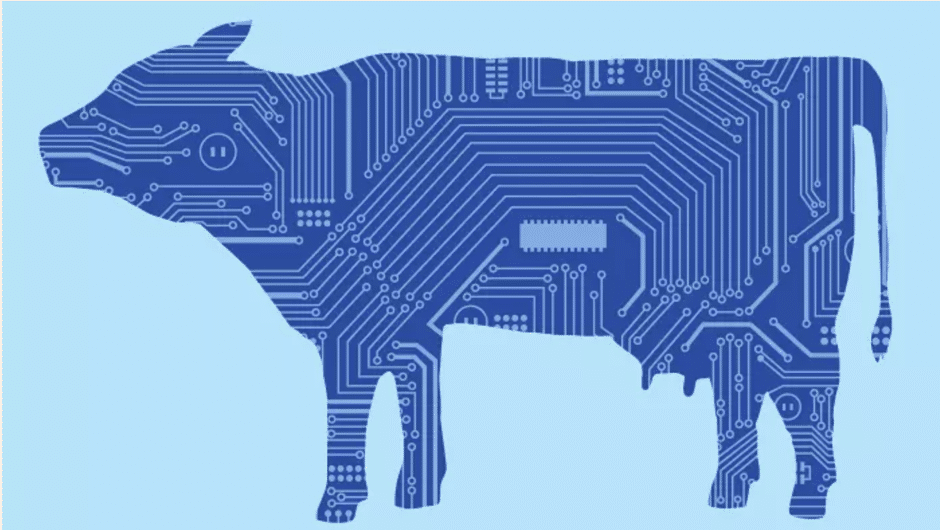5G is a term more people are becoming aware of. Despite its current chaotic state, 5G is likely to transform our lives in more fundamental ways than anything since the iPhone. The world economic forum thinks it’s a fundamental step forward . They suggest that 5G could impact the world in the same way that other inventions like the car, the jet engine or electricity did. Those were innovations which affected the entire economy, not just one section of it. 5G is a big deal.
The Australian government is, perhaps surprisingly, ahead of the curve on 5G thinking. Realizing its importance, they are fast-tracking a number of initiatives, including freeing up the multiple different types of radio frequency spectrum that are required to deliver 5G. 5G requires types of radio frequencies that previous generations of cellular data transmission did not. To deliver the benefits of the Internet Of Things, spectrum at the lower end of frequency ranges is required. This allows for long distance, broad coverage. Separately, relatively high frequencies are required to transport data in high utilization areas like cities. The government is providing both and doing it quickly so we don’t fall behind against our International peers.
And it’s not just the Australian government who realize the importance of 5G, either. The US government, under Donald Trump – a free market Republican of sorts – has seriously considered setting up their own national, government built 5G network, concerned over the strategic risks that allowing such critical infrastructure to be built by commercial interests might present. In Australia, similar thought was given to the rollout of the NBN. It was decided that we wouldn’t allow Huawei, a Chinese networking equipment manufacturer, roughly analogous to Cisco, although in this context, clearly with a better price, to contribute hardware to the solution. Reading between the lines, there was a concern in both governments that once we become reliant on 5G, miscreant rival governments could ‘turn off’ the 5G facility leaving us crippled.
Those in industry and government clearly realise that we need to get 5G right. The rest of this article is dedicated to everyone else. In it, I try and explain why 5G will change things in ways which will affect us all. Specifically, here is what I think 5G will create. We explore each in more detail, below :
- The most valuable things we use will be even more centralized in the cloud:
The world will benefit from ‘information network effects’ as complimentary technologies, including 5G collect, transmit and store for analysis previously ignored information. Conversely, through remote manipulation at relatively low marginal cost, these valuable things – services and facilities – will be more widely available than when they were distributed. - Computers and phones will change dramatically:
The Chromebook is the closest thing we have now, to what we will use as phones, when 5G arrives. Newer, 5G phones will use a browser and some of the technical features of 5G to access and manipulate data, the majority of which is held in the cloud. This is likely to lower device costs and disadvantage current industry leaders, like Apple, who focus on the production of ‘high end’ (more expensive) devices. - The issue of identity will become central:
Your phone companies will own and manage your identity, using it to provide you with a host of services, many of them new. Information products you used to hold amongst your personal artifacts will be stored away from you, presenting a risk to your security and privacy. - Telecommunication costs rise dramatically:
We will spend more on cellular data both in dollar terms and as a proportion of family expenditure / business expense. The pressure that this cost growth will create will stimulate services to optimize and lower what we spend in these areas. - There are some other things which happen at the same time as 5G :
Especially in light of the eSIM and Mobile Broadband. Artificial intelligence will be fuelled by 5G solving problems we previously couldn’t.
The problem with the analysis of 5G which has happened so far
Before we consider the changes 5G will herald, it’s worth considering some of the things, currently in place, which might prevent us thinking about this new technology, as we should. There are 2 major problems with the way 5G is currently being considered.
Problem 1 : There’s not much good information around
Discourse around 5G and its rollout consistently centers on the same 3 factors, causing us to watch the ball and not the space – that is, to focus on what is being said about the reality of the problems being experienced, rather than the broader societal implications of the new technology.
Problems being experienced :
- 1. Standards are not agreed:
The media, based on telco analysts, suggests that 5G will be here in 2020 while simultaneously pointing out that the various worldwide standards required to deliver it by that time are far from being agreed. I write this article in February 2018 and January 2020 is not that far away. As things stand, laboratory tests of 5G are taking place but final agreement on the standards behind them are not yet agreed. - 2. The technology is physically unwieldy :
The current 5G radio array testing equipment being used to verify the potential (usually in terms of ‘Mbps’ megabits per second – the rate at which 5G can transmit and receive data) is, apparently ‘the size of a large laptop.’ It’s hard to imagine carrying that in your pocket. Radio masts used to transmit and receive 5G signals are said to be expensive to produce, require weird places to live and are said to have rotating RADAR like concave receivers. Each of these features provide a picture of technology which is hard to reconcile with ‘real life.’ - 3. The same first step examples:
I guess the reporters which cover the story have broad beats and have come only once to the subject of 5G. That’s not to say these are bad examples, they’re just not the only ways to explain the technology. The articles available seem to give the same examples every time: 5G will help with driverless cars, improved healthcare including doctors operating remotely in far flung places, and the ability to download every episode of Game Of Thrones in 10 seconds.
Problem 2 : We’ve seen it all before
Secondly, our ability to imagine a future which has all the benefits of 5G, has a millstone around it’s neck. We have all experienced previous generations of network upgrades, which were hyped and then, in large part, never lived up to the marketers’ dreams.
- 2.5G GPRS modems in the early 2000s with 64kbps (I’m going from personal experience sitting in a Helsinki Holiday Inn there) was impractical for any non work, non ‘emergency’ use.
- WAP – the mobile internet technology vaunted as the unicorn use of GPRS (before we had the term unicorn in this context) was pretty much a total failure despite getting everyone very worked up.
- 3G, promised video calling. It garnered a spectrum sale of such magnitude in the UK that English people enjoyed a penny off their income tax the year after the auction. 3G was similarly over promised and under-delivered. For example, not many of us make video calls these days.
- 4G and 4GX : Almost 10 years after its introduction, only around half of Australians now have 4G phones. Those that do might find it hard to articulate the main benefits because those benefits relate to things those people are NOT experiencing. YouTube DOESN’T buffer when you load a video. Google or Apple maps DON’T contain big black squares when you swipe quickly through them.
For those not in the industry, already overwhelmed by the need to stay current on what version of iPhone they should have, suggestions as to the importance of 5G must seem familiar and provide a sense of foreboding.
The key things you need to know about 5G
Getting somewhere useful (if speculative) with consideration of 5G requires that we know only 2 things from a technical standpoint.
- It’s fast:
Users will perceive virtually limitless capacity in the network. They will be able to download every HD episode of Game Of Thrones in 10 seconds you know. One more useful example might be one I read from Huawei. In it, the company compared the response time of an autonomous vehicle being managed centrally and which was faced with an emergency situation which required a ‘break’ instruction. With 4G, if that vehicle is travelling at 60 mph and it ran in to trouble, from the image being received to the break instruction being passed, would take 4 seconds, during which the car would travel 120 meters. If the car was 5G enabled, it would start breaking 2.8 cm after the image was received. - It has low latency:
Latency is the time between a request being sent over the network and the response coming back. 5G fosters connections latency in the region of 1ms. Importantly, humans find it hard to detect latency less than one fifth of a second.
It’s important to overlap these two things and consider them from a human perspective. The mental model you’ll get is significantly different to what you’re used to. Your current experience of a webpage loading, is that it might take a few seconds. You click the button on your computer and quite often you’ll see the page get ‘painted’. That won’t be the case with 5G. Any delay there is will come from the server side or the processor on your phone. To all intents and purposes, 5G will be ‘magic’ in terms of speed to users.
The nano second someone asks for something online (in the cloud) they’ll have it. ‘Magically’, there will be no delay. Want a TV show ? Boom. It’s there. Immediately. All of it. No streaming. No rotating clock. No ‘try again’. No ‘Do I need to press that again, did I press that button?’ It will be there.
5G is also designed to require very low power levels so it can support a lot of connected devices with batteries which will last a long time. 5G will provide you a totally networked world where every peripheral is ‘thin’ and connected to the internet. One of the key considerations here is the Internet Of Things, a parallel technology stream happening alongside the development of 5G. We have an example of that below.
5G is a revolution not an evolution. It will change the world in fundamental ways – as measured by the things we don’t talk about. 5G will assist with connectivity in remote areas of Australia and, offer opportunities for more efficient ‘precision agriculture.’
The most valuable things in our lives will be centralized in the cloud
The fact that 5G is so fast and has such low latency could lead to a seismic shift in the types of devices we use. We keep things (files – music, films, TV shows, pictures, videos we’ve created) locally on our phones. Memory is expensive (potentially about 7.5% of the cost of a phone) – as you can see by comparing the iPhone’s 64GB version with the 128GB version of the same device. The only difference between those products is the memory on board. And it’s not just memory which is expensive and which will be, in the future, of less use in a phone.
Some estimates suggest that already, 90% of the processing power in the world sits idle at any one time. The rest resides in PCs which are waiting for someone to turn them on. Processors too are expensive. Some estimates suggest that they make up about 10% of the cost of a phone.
We keep these things local to us because the result is a more convenient experience of our phones. The alternative would be to keep pictures in the cloud, for example. When we needed them, we could download them and look at them. On 4G, however, latency and (relatively) slow download speeds would make that a time consuming business. Similarly, the ability to edit files would require that what was being edited be uploaded, worked on in the cloud and downloaded again. With 5G, the incredible speeds and zero latency mean that it would be better to keep files and work on them in the cloud. Storage costs would be lower. Processors would be cheaper – we’d be ‘sweating the asset’ by using them more.
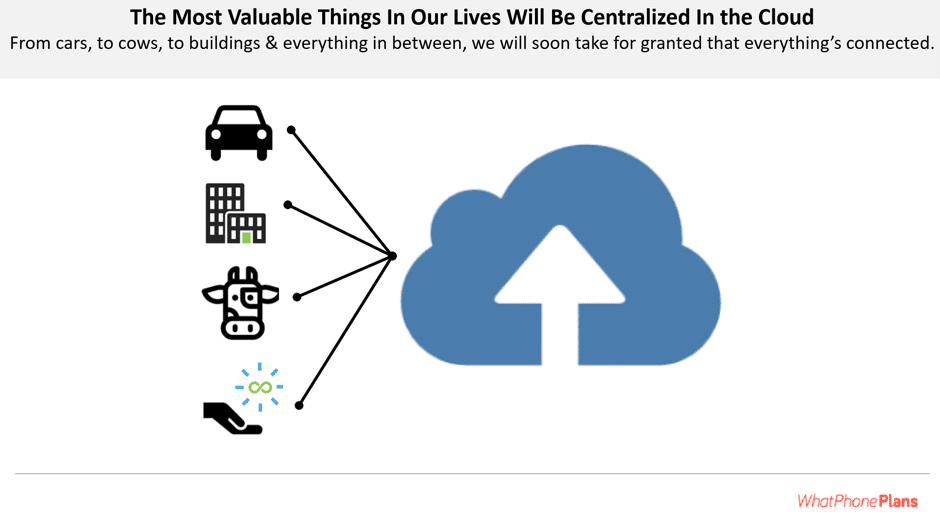
5G will move our most valuable services to the cloud.
Implications of centralizing everything – in order of importance:
Everything will be held in the cloud:
Network effects are economies of scale experienced when the value of a product is increased by the number of people that use it. When 5G launches, we will experience Information network effects from all the sensors and computers which join the internet ? 5G will lead to the storage of more data which will fuel the AI revolution currently taking place (more on this below) and help us solve problems we never knew we could. We will be able to cross reference information of all sorts which is currently not even recorded, providing those information network effects.
Demands to make server side performance happen faster are going to increase:
One of the biggest drivers of good SEO performance now is the speed with which pages accessed over the internet load. More than 50% of all internet access is through mobile devices. With 5G, SEO focus will turn to faster servers rather than optimizing page size.
Telcos will have the chance to sell you services:
Something I have covered in my personal blog and which seems to underpin the component of Telstra’s strategy we never discuss. (Perhaps because it is ‘slow news’) is the number of new services 5G will enable for telcos. Phone companies have always wanted to sell services on top of ‘carriage’- the data bundles they currently provide. 5G will allow a host of new revenue streams for them if they approach it intelligently, from allowing the sale of data bundles which let people watch as much TV as they want to (something some carriers are doing already) to tracking and storing medical information about you.
Centralizing services could make them even more available:
The classic example here is surgeons operating remotely on people in the bush, using the zero latency to cut and slice people on the operating table as they would if they were in the same room.
These changes will make it easier to regulate and oversee:
There will more information to analyse and meta data recorded on everything (provided by devices, things on the internet of things and information which is now stored in the cloud) to which the government now has easy access. (The law was changed in April 2017 allowing the government relatively easy access to the information telcos hold.) Will it be harder to cheat on your insurance or call in sick to work when your phone knows how fast you drive and whether you have been in contact with people who are now sick?
And for a technology which is mobile focused, it could actually solve a lot of the more expensive problems associated with the provision of (now) fixed telecommunications to remote areas, replacing the need for expensive trenches filled with fiber. %G can offer above ground high capacity connections over great distances. Cheaper than digging holes and putting fiber in to them.
The Internet Of Things / Cows
Also of critical importance is the way 5G will underpin our ability to connect physical aspects of our lives to the Internet. 5G’s low power requirements will allow every ‘object’ (physical thing) in Australia to be connected to the internet.
Source: Meet the “connected cow”
One memorable example is the internet of cows. Attaching cows to the net might seem a strange notion, but then you’re not a dairy farmer. In an example from several years ago now, one farmer did connect his cows, with cheap sensors, to the internet. He was trying to solve a problem which required more understanding of his herd than he had at the time. Half of his livestock produced a lot more milk than the other half.
The data received indicated that the best producing cows were using a part of the field they inhabited to graze. These cows tended to loiter at the bottom of the hill, near the river. It was the better grass that they found there which was leading to higher milk yields. The farmer put a fence up so all his cows ate in the same area. His milk production went up at no cost.
Whether apocryphal or not, the story serves a purpose. The ability for 5G to connect previously unconnected items to the internet will result in efficiencies currently unimaginable.
Computers and phones will change dramatically
These are Chromebooks (see image below.) They’re a ‘new’ (since 2011) type of computer – one in which onboard resources like processors and memory are kept to a minimum. I bought one for my Goddaughter and myself when they first came out to have a play and to introduce her, then 6 years old, to the concept of ‘the cloud.’
Google are the technology company behind Chromebooks although they are made by manufacturers including Samsung, Asus and HP. From that information alone, it’s possible to conclude that these companies see the future of computing, potentially mobile computing, as being much more simple at the terminal end (that’s the bit that you and I use) with file storage and processing being done off device in the cloud.
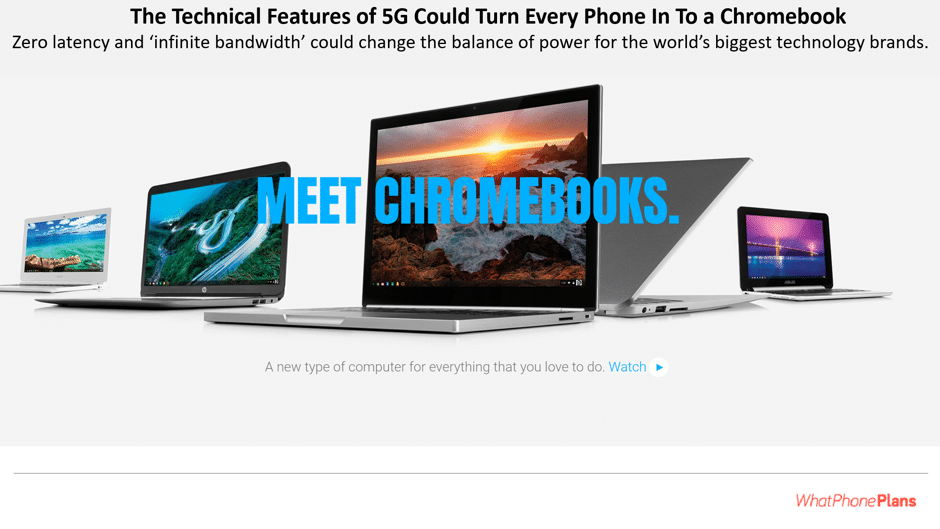
Chromebooks are inexpensive internet focused computers.
Above – Source: Google Chrome site.
Chromebooks operate entirely through the Chrome (Google’s) internet browser. Chrome is the Operating System – a ‘thin client’ as opposed to all the bells and whistles of a larger, more complex Operating System (OS) like Windows.
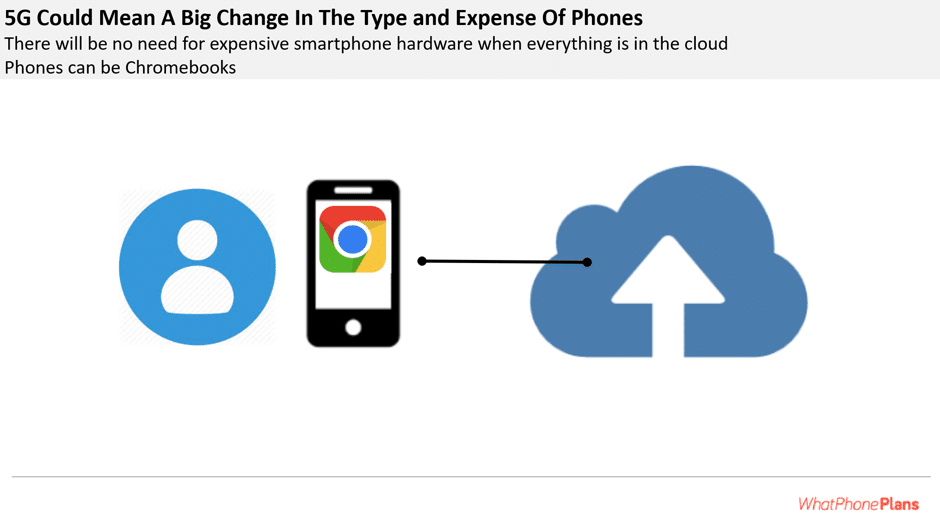
5G could turn your phone in to the equivalent of a Chromebook.
A collection of web based apps have been developed for Chromebook which complement the browser. You can play PacMan in HTML 5 if you’d like, or transfer videos from a memory stick in the USB port of the device to the Chromecast in the back of your TV, using services like Videostream.
Implications for phones when 5G comes out:
Your phone and laptop will be cheaper:
Imagine a Chromebook equivalent of your phone. Now everything is in the cloud and can be accessed instantaneously without lag (because of 5G’s near zero latency), why would you buy a device with 128GB of RAM? (see text above for the costs of this) Who would have songs stored locally on your device when you can download an hour of audio in a fraction of a second?
A move of this sort to lower spec phone could disadvantage Apple and Samsung – companies whose propensity to spend a lot on marketing is enabled by the high prices they charge for their smartphones and the high margins they pocket as a result
There will be no need for phones to have high power consumption, high frequency processors – all the heavy lifting (serious calculation) will be done in off device in the cloud. Is it beyond the pale to suggest that phones will be very cheap, essentially free by today’s standards and a baseline model could be provided free like SIMs are now, with any phone contract. (Phone companies currently ‘hide’ the price of phone hardware in their contract plans.)
Huwawei and Oppo, both Chinese phone manufacturers with expertise in servicing the lower end of the smartphone market seem like a better bet than the current market leaders. Perhaps we will look back at the lawsuits over who stole whose features and think what a waste of time it all was.
Downtime will be hard to deal with:
If and when we come to rely on phones of this sort, we will find it much harder to deal with the lack of a network signal. Telstra’s suffered a number of outages in 2015 / 2016 and the backlash was substantial at that time. How much worse will it be if everything from a phone and most of the services we use are held in the cloud?
I used to be the BlackBerry Product Manager at Vodafone UK and when that service (the BlackBerry email delivery system) stopped, people went nuts. This emotional response to inevitable network downtime will become even more prevalent.
Streamed services mean you rent it, don’t buy it:
I used to buy videos and line them up on my shelf. Now I pay a monthly subscription and receive my video entertainment from Netflix and Stan. When everything is in the cloud, you possess things only temporarily, for the period during which you are using them. Then, content is thrown away until you need it again.
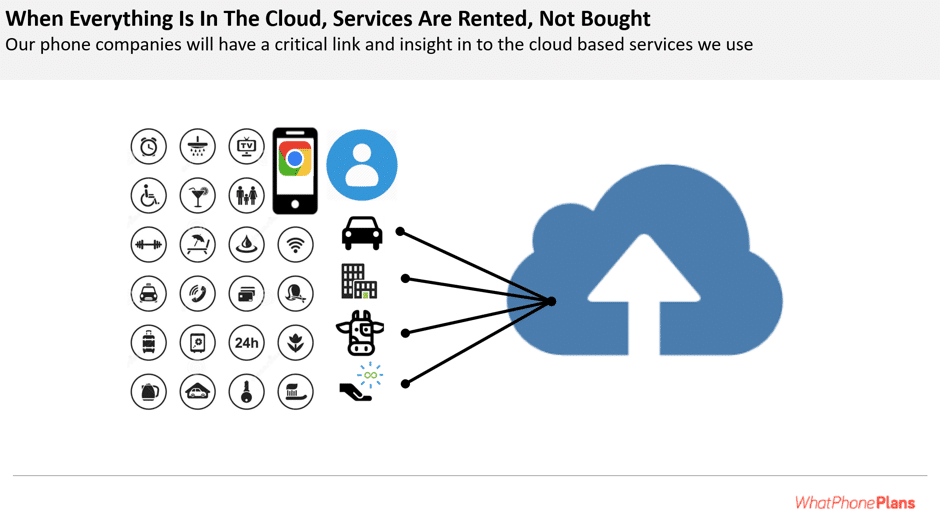
It’s likely we will see new services from our phone companies (and many other places) to deal with this circumstance.
In the same way Spotify helps you rent music, 5G will lead to more and more services being rented.
Finally, WiFi will have to catch up:
Our expectations of a new technology are pegged at the highest standard we have experienced. If we buy something on Amazon, we expect the next online store we go to to be as good at eCommerce as the US retailer. When 5G becomes incredibly good, it will have the same effect on our expectations of WiFi technology as the Amazon experiences does on shopping. We will expect the WiFi have in the house to work just as well as 5G. The technical standards will have to improve.
The issue of identity will become (even more) central
Whether you are mobile and using that phone or at home and using your wireless, or in town and using someone else’s’ data access, telcos will be providing you that service. It makes sense for them to manage the process of identifying and validating you for whatever services they are providing you. 5G is likely to mean that your phone company will help you manage a single identity and use that to authenticate you for the use of many services. Any information products (Netflix, Evernote, Music) will be rented, not bought. Life will be more convenient. There will be more risks to our security and privacy.
I’ve been thinking of the problem of information identities (IIDs) for a long time. 10 years ago at Vodafone, it occurred to me that we had a lot of IIDs and that the number seemed to be increasing. At the time, I had a mobile phone number, A BlackBerry PIN (Pager ID number, a pretty geeky BlackBerry thing) a landline phone at home, a postal address at home, a different one at work, a fax number and two email addresses. But there was only one me. It seemed a lot to remember and potentially a problem telcos could make some money out of solving.
It would make sense to keep all your profile information in a central spot, too and to download it to whatever circumstance you’re in. A driverless vehicle, for example, could be set up with your preferences, music, streamed video service favorites and so on, the moment you enter it. From a phone company point if view, your billing identity is an important thing. As a result of a rise in the number of devices people have, identity is likely to change. Digital identities can be used to logon to the increasing range of services we buy from our phone companies.
Luckily, the GSMA has been thinking the same thing. Since 2013, they have been working on a solution to the identity problem for phone company operators which recognizes the fact that more and more of our interactions are digital and conducted over wireless networks.
As a result, telecommunications costs rise dramatically:
With everything being connected to the internet and every service being rented over a cellular connection, the cost of accessing the telco networks will continue to rise both in absolute $ terms and as a proportion of our incomes.
Rising usage of mobile data:
Putting aside the facts that data usage is growing quickly anyway and that, by the time 5G rolls around, there could well be new services which use a lot more data – mobile broadcasts of 4K TV, AR, VR for example.
One of my favorite charts of all time :
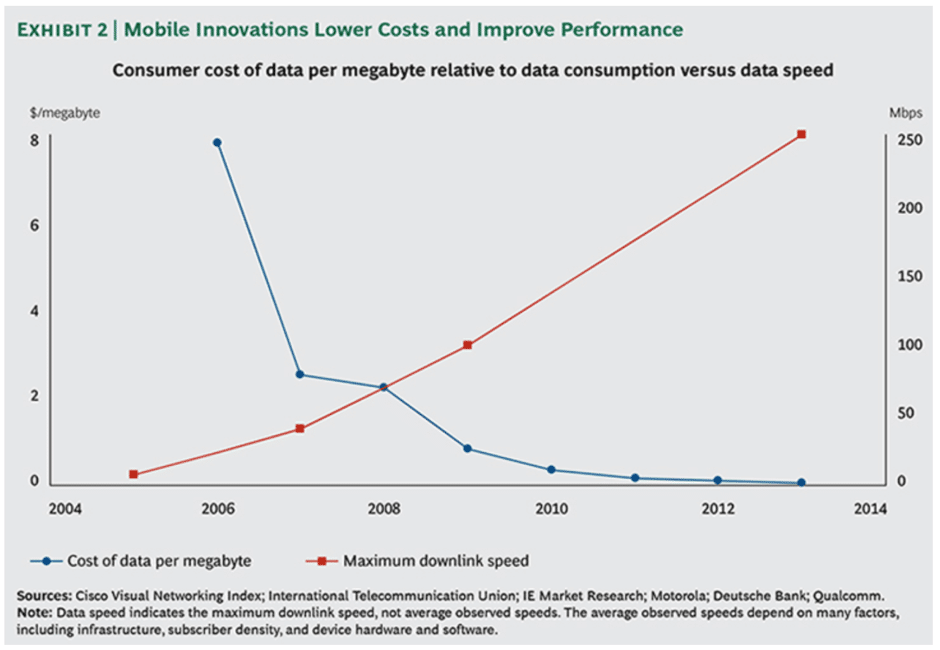
World Economic Forum Of course, what you don’t see on here is the rise in mobile data use which rose at an also exponential rate leaving telcos’ revenue streams largely unaffected.
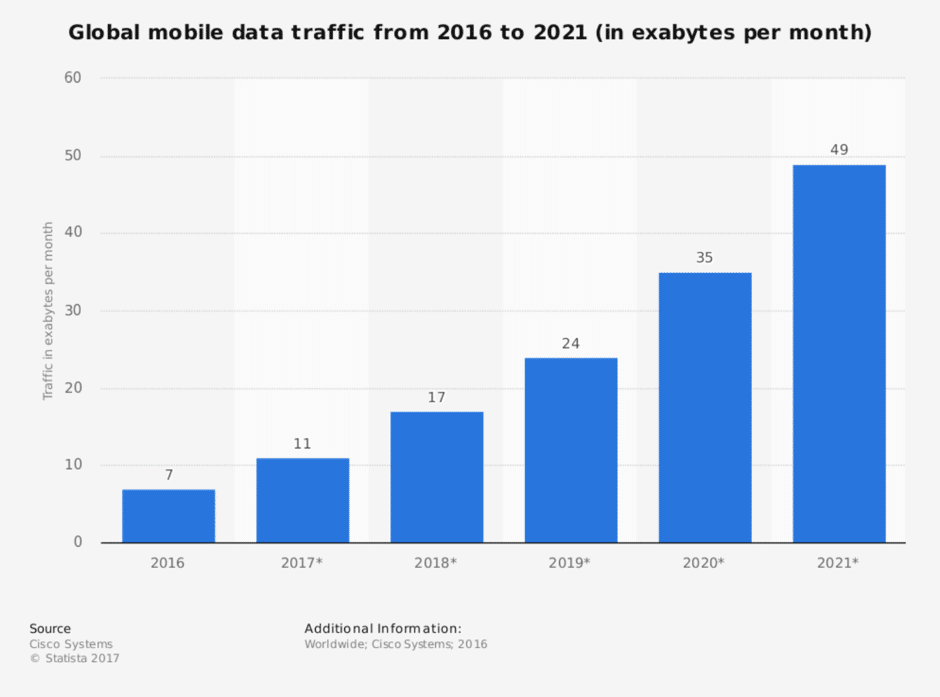
Above: Source: Cisco
Incentives to cut those costs:
Phone bills are now a part of life. They chew up about 5% of family budgets. Parents spend 4 times on phones and services for them than they do on school uniforms.
One perhaps perverse effect of the increase in telecommunication costs we will seem will be to create an enormous incentive to eliminate these costs. And remember, there will be a lot of information available to help people find solutions to that problem. Your phone already knows how much data you use, what the trends of your usage are – do you use more on weekends or week days? What time of the day? Piecing this information together, to match it with a better deal may not be too hard.
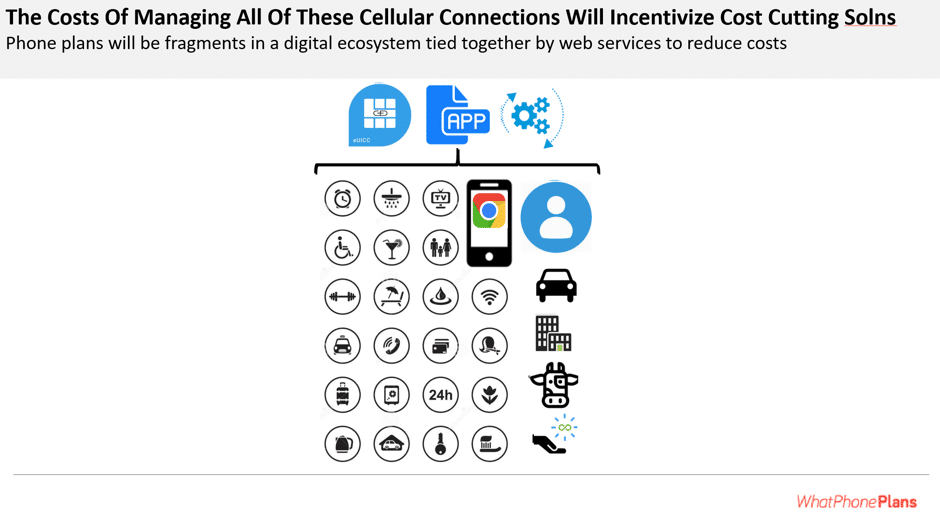
When your cow, car and everything else is stored in the cloud, you get a bigger phone bill. Services will be developed to reduce those bills.
There’s no problem with phone bills costing more. It’s a question of cost not value and people will just prioritize.
Some things which will happen at the same time as 5G
A rise in the number of Mobile Broadband connections:
Mobile Broadband connections, particularly those with ‘large’ sizes (those in excess of 25GB) is one of the fastest growing categories of product sales on this site. These sizable data allowances can be used as a backup or even alternative for fixed line connections. They are provided at price points which keep halving, year on year. Even before 5G launches (see below) aggregated (turbo charged) 4G speeds are making it an attractive product.
Artificial Intelligence and 5G
5G is a revolutionary technology, we we’ve covered. It will be rolled out alongside another technology,Artificial Intelligence.
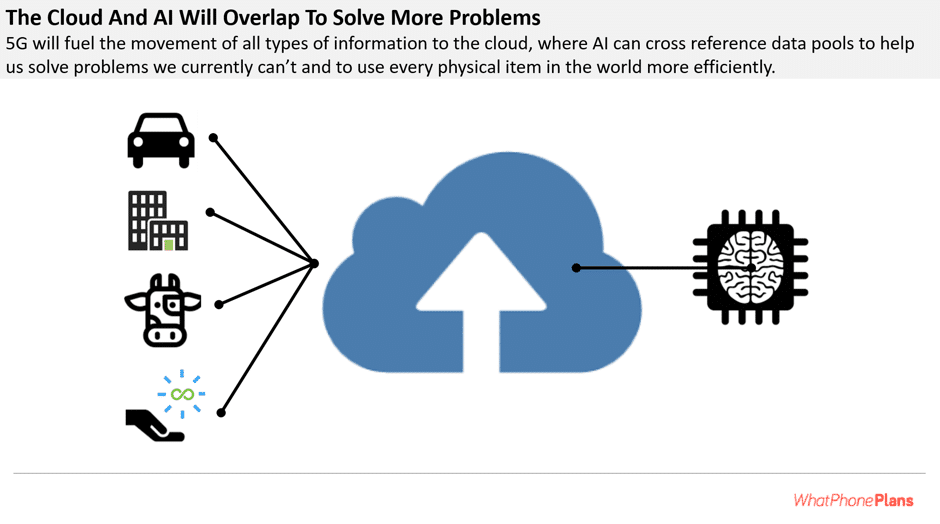
Artificial Intelligence is best understood (in my view) as ‘fuzzy’ pattern matching. By exposing computers to large amounts of information, AI engineers use a technique known as ‘back propagation’ (BP) to associate what they’re seeing in the data with a specified outcome.
Imagine if you had an app which sold cars and you wanted to understand whether users of the app were uploading pictures of the front or the back of the car, to assist in labeling them, so other users could search the app for ‘see front of car’. You could provide half a million pictures of the front of cars to a computer which would use BP to do a ‘fuzzy’ match for future pictures. It could ‘learn’ from all the examples it had, what the front of a car looked like.
The technique of BP hasn’t changed much since its inception. What has changed and one of the key driving forces of the success of Artificial Intelligence has been the availability of large quantities of data to feed through the BP algorithms. Much of that data is now available because people store it in the cloud.
As 5G expands the amount of information from people and artifacts which are in the cloud, it will ‘feed’ one of AI’s key needs – large amounts of information so it can ‘learn’.
The eSIM:
As we’ve covered elsewhere, the eSIM is likely to lead to multiple profiles on a (s) SIM at one time. In simple terms, imagine buying your Unlimited voice and SMS from Optus and your 10GB data allowance from Telstra.
If you’ve got your head around that, now imagine the same thing but the data allowance for your phone is also split between you and your family, you share your phone number with your watch, car and boat so that, wherever you are, you can be found on a single phone.
The rising costs of telecommunications which will be associated with 5G and the complexity behind the number of eSIMs involved in providing you that data to the products that need it, will create strong economic incentives for automated solutions to the problem of minimizing those costs.
Summing up the impacts of 5G
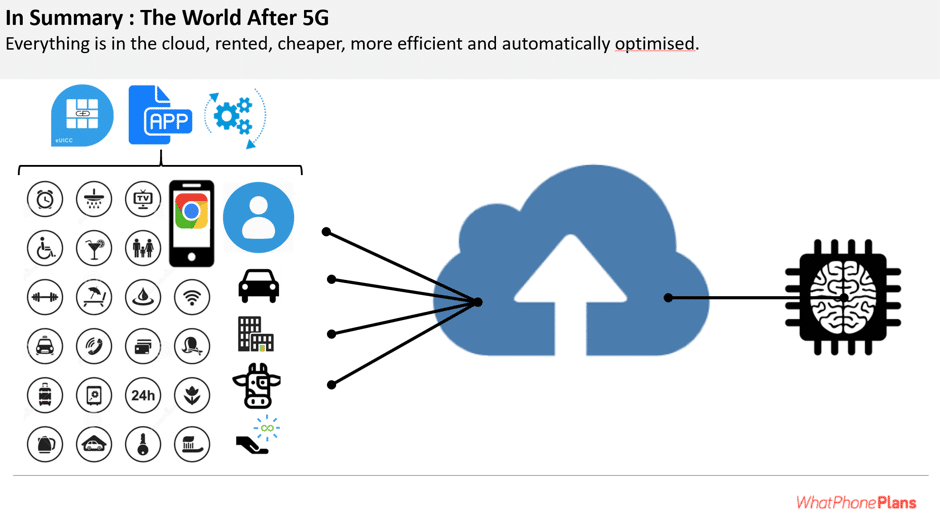
5G is going to affect us more than any network upgrade which gave us faster data speeds. That’s despite what our experience with previous generations of enhancement might lead us to intuitively believe. At an overall level, the impacts on the economy will be substantial (and will happen alongside the AI revolution which, too, could accelerate growth.) At a more micro, personal level, the primacy effects are going to be different devices, increased reliance on cloud services and higher phone bills which will need to be managed better.
The world after 5G
The sharing economy gave us layers of efficiency, using resources which previously laid dormant for cars (Uber), bedrooms (Air BnB), bicycles (Liquid) and so on. 5G will offer an equivalent level of efficiency in helping us answer questions on how we can use cows, tractors, factory machinery, agricultural fertilizer, streets, shops. There are hundreds of aspects of life which are inefficient that we take for example.
5G will lead to every object (building, animal, person, coat, car, boat, BBQ) in the world being connected to the internet in the same way as individuals were connected with smartphones. Perhaps among the most imrtant aspects of what 5G will mean to Australians is demonstrated by conjecture about what it will stop us talking about. Life has changed a lot, even in the last 10 years. Now, we don’t think twice about every person having a smartphone with us everywhere, every company having a website, and every interaction we want to undertake being possible with an app. The effect of 5G will be similar. When we ask a dustbin who owns it and when it was last emptied – and it tells us – and we don’t think twice about it, 5G will have changed our lives.
The result will be efficiency for businesses and people. A lot of information being generated and stored, in the cloud, interpreted by AI. Tools which help us manage those costs. And the results of that will be an improvement in our ability to go about our lives – our work and our social lives in a way we will take equally for granted.
